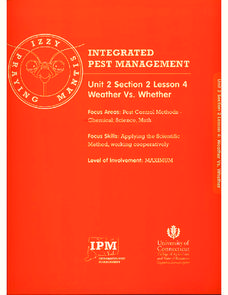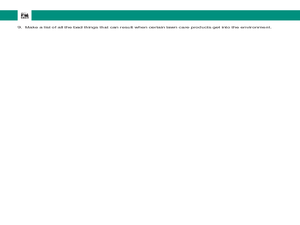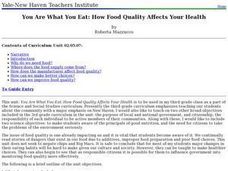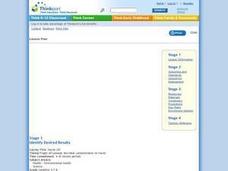Curated OER
Pesticide Watch Card
Students examine human health by identifying dangerous pesticides. In this agriculture lesson, students research the food production system in the United States and discuss dangers such as pesticides, chemicals and insecticides which...
University of Connecticut
Weather Vs. Whether
Monarch butterfly populations have decreased by 90 percent over the past 20 years due to misuse and ineffectiveness of some pesticides. Given the challenge to increase pesticide safety and effectiveness, the class, through discussion,...
Curated OER
Natural Gardening
Students study the effect of pesticides on plants and insects. In this gardening lesson, students discuss the importance of insects. They define pesticides, evaluate their effectiveness and the problems they might cause. Students...
Prince William Network
The Incredible Journey
Divide your school gym into breeding grounds and non-breeding grounds so that your zoologists can play a game simulating the seasonal migration of shorebirds. Players pick one of the included game cards and follow its directions, which...
Earth Day Network
Staying Green While Being Clean
Clean up the environment with a lesson that focuses on replacing hazardous cleaning supplies with green, environmentally-friendly products. Using a dirty patch of surface as a control area, kids clean other parts of various surfaces...
Michigan State University
What is IPM?
Learners view a plastic cockroach, mouse, or picture of a pest and discuss if they belong inside the house or school. They discuss what a pest is and brainstorm what makes it a pest and ways to get rid of them. They then discover dangers...
Curated OER
Diet: You Are What You Eat
Third graders examine the issue of food quality to assess the dangers of pesticides, additives, and improper food preparation. After keeping food diaries and categorizing foods, they fill in food pyramids based on their journal entries....
Curated OER
Hazardous Household Products Word Search
In this word search learning exercise, students find fifteen words related to hazardous material in their homes. Words include pesticide, danger, flammable, warning, etc.
Curated OER
What's Hiding in Your Home Cabinets?
Learners analyze a variety of products found in their own homes to determine their toxic content. They identify words such as caution, warning or danger and relate them to their relative toxicity levels.
Curated OER
Midnight Dumpers
Students explain how pollution affects ground water. They participate in a simulation to discover the location of an illegal dump. Students explore the monetary benefits, risk and environmental concerns are factors in business decisions.
Curated OER
Reading Comprehension- Informational Passages "Pollution"
Practice reading comprehension through this pollution worksheet, which has learners read an informational passage on various aspects of environmental harm. Key terms are in bold, and are used on the next page in the comprehension...
Curated OER
Honduras Finding the Top Bananas
Eighth graders complete an online scavenger hunt about banana cultivation before they visit a grocery store to examine banana products. They investigate "certified" means in relation to banana production and read the "Rainforest Alliance...
Curated OER
What is Hazardous at Your House?
For this hazards in the home worksheet, students unscramble hint to discover words of hazardous household items, 6 total. Answers included on page 2.
Curated OER
Safe Subs
Students investigate ways to reduce use of hazardous materials. In this safe substitutes lesson, students review hazardous wastes used in many homes and possible safe substitutes for these harmful chemicals. Students write and decorate...
Curated OER
Champions Of The Land
Students write an abstract of a book concerning conservation. In this environmental activism lesson, students explore books such as Silent Spring by Rachel Carson. Students choose a book about conservation from a suggested book list and...
Curated OER
CONTAMINANT SCAVENGER HUNT
Learners identify substances and activities within a household that contribute to water pollution and identify safe cleaning alternatives for commercial cleaning products.
Curated OER
Hands Off
Middle schoolers perform a handwashing experiment to see if a difference can be detected in the number and types of microbes on our hands after various types of cleaning. They will also demonstrate that they have learned the whys and...
Curated OER
Finding and Measuring What You Can't See
Students determine how scientists measure pollutants in food and the environment. Students discover how scientists remove one material based on its physical properties. Students figure out how much of a pollutant is present after...
Curated OER
Household Hazardous Waste Identification
Fourth graders learn about reduce, reuse, and recycle and identify household hazardous products. Students learn about less hazardous alternatives and complete an inventory of hazardous materials in a typical household.
Curated OER
Petroleum Poisons
Students discover how harmful petroleum distillates are that are found in the home. They demonstrate how to collect information about consumer products. They also ask their parents about the safety of the cleaning supplies used in their...
Curated OER
Household Hazardous Waste Identification
Fourth graders discuss the concept of reduce, reuse and recycle. They identify products in their homes that are hazardous and discover alternatives to them. They examine the inventory of other classmates hazardous materials.
Curated OER
The Numbers Game
Students examine how to calculate the part-per-million and part-per-billion units used to measure contaminant concentrations in the environment. They calculate ratios, take a quiz, analyze a sample chemical spill, and determine if...























